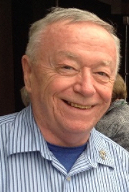What is a religious brother, really?
Br. Denis Claivaz fpm
In September 1975, I arrived in the northern part of Ghana, West Africa, specifically in a town called Navrongo, where I was to begin my new life as a Missionary. In my orientation days I was asked by a number of people, some who should have known better, why I had become a “Brother” and had not gone “all the way” to Priesthood. After all, my academic qualifications pointed to a “higher” vocation than brotherhood.

I guess I could understand these queries in the environment in which I found myself. It was the “White Fathers”, the Missionaries of Africa, who had opened up the trail of Christianity here. Their way of entering into new mission territories was to allow the Brothers to go first so that the infrastructures could be put into place. The Brothers, who were the carpenters, plumbers, masons, etc. the artisans of the group, took the lead and so the locals became accustomed to seeing and working with these men in putting up the house for the Fathers, the school for the kids and the Chapel for the Lord. They were the ‘hands on’ people of the Missions.
Neither was there a great deal of surprise in these queries about being a Brother, as I had spent a great deal of time, on my vocation journey, answering the very same questions. Why a “Brother”? Ever think of the Priesthood? Something the Sisters have yet to encounter. It is amazing how misunderstood the vocation of a Brother really is. However, I have never questioned my “call” to my vocation as a Religious Brother.
On October 4th, 2015 (the Feast of St. Francis of Assisi) the Vatican published a document about “being a Brother”. It was entitled the “Identity and Mission of the Religious Brother in the Church”. A document long overdue but much appreciated. In it the official Church gives a recognition of the uniqueness of the Brother’s vocation which had not been analyzed in such depth before. Usually the official definition of who a Brother is would suffice: “A religious brother is a member of a Christian or who commits himself to following Christ in of the Church, usually by the vows of poverty, and obedience”.
But the Vatican document seems to give a weightier stance to the vocation. It states, “the bonds of communion of the Religious Brother extend beyond the boundaries of the Church, because he is driven by the same “universal character that distinguishes the People of God. The vocation of the Brother is part of the answer that God gives to the absence of brotherhood which is wounding the world today. At the root of a Brother’s vocation lies a profound experience of solidarity that essentially matches that of Moses before the burning bush: he discovers himself as the eyes, ears and heart of God, the God who sees the oppression of his people, who hears their cry, feels their anguish and comes down to liberate them”.
I believe that my authority to “be a Brother” is directly related to the fact that the Lord called me to be one. It is in the call that the Brother is introduced to the Lord and can become intimate in his relationship with Jesus. It is Jesus who works through me. I have noting and am nothing if it is not ‘in the Lord’. My relationship with the Lord is the foundation of my vocation.
In my early discernment I visited St. Joseph’s Oratory in Montreal every month. This place was built by a simple person who had a huge heart and a great devotion to St. Joseph. On my visits to the tomb of Br. Andre I had many discussions with him about who I was and where I was going. His gentle guidance steered me along the ‘right path’. The magnificence of the Oratory was in stark contrast to the utter simplicity of the ‘man’. I wanted to be like Andre. And so, when I revealed my decision to my family and friends, I took solace in the great faith of this simple man.
